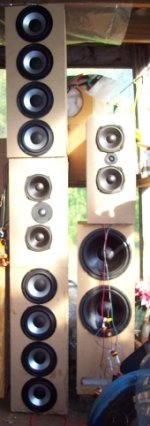Sjef said:speaker units with very low RMS, high Qms (not too much self dampening), low Xmax, short voice coils, stiff surrounds and lightweight cones. At least that's my experience for a "revealing" speaker even at very low volumes.
why is low Xmax and low power handling a "revealing" trait
http://www.partsexpress.com/projectshowcase/dr-k-mtm/index.html
I finished testing the Dr. K's and found them too revealing. About 70% of my CD collection sound like trash on them, but the good Cd's sound most excellent on them. They have very low distortion motors on them for one thing. So now it's on to my Rock&Roll speaker design (project) so I can play the rest of my CD's....
I finished testing the Dr. K's and found them too revealing. About 70% of my CD collection sound like trash on them, but the good Cd's sound most excellent on them. They have very low distortion motors on them for one thing. So now it's on to my Rock&Roll speaker design (project) so I can play the rest of my CD's....
Attachments
I believe I did not mention low power handling. I did mention low Xmax.
Many loudspaekers nowadays follow the same trend for high x-max drivers. This trend was started to design the smallest possible cabinets with the deapest bass. from my own experience I have found that thes high x-max drivers have way too much mechanical losses, too much self dampening and needs a lot of energy to start even moving at all (Rms) think of what that does to low level detail. this kills a lot of the liveliness of the sound, but hey what the heck, it measures better and it fits in smaller enclosures and isn't that exactly what 99% of the consumer want ? So lets manufacture them, it sells good. In other words, don't always believe the hype.
Many loudspaekers nowadays follow the same trend for high x-max drivers. This trend was started to design the smallest possible cabinets with the deapest bass. from my own experience I have found that thes high x-max drivers have way too much mechanical losses, too much self dampening and needs a lot of energy to start even moving at all (Rms) think of what that does to low level detail. this kills a lot of the liveliness of the sound, but hey what the heck, it measures better and it fits in smaller enclosures and isn't that exactly what 99% of the consumer want ? So lets manufacture them, it sells good. In other words, don't always believe the hype.
I think what Sjef is trying to say, is not necessarily that you want low xmax drivers, but *normal* xmax drivers. Rather than these ultra-extended 15mm xmax 8"/10" bass drivers that are trying to cover the same frequency range as an 18" with *normal* xmax.
For fidelity, it's always preferable to have surface area over extension, given that other factors will allow for it(waf/saf, that the room is big enough to house such drivers etc etc...)
For fidelity, it's always preferable to have surface area over extension, given that other factors will allow for it(waf/saf, that the room is big enough to house such drivers etc etc...)
Audiophilenoob said:
why is low Xmax and low power handling a "revealing" trait
In this instance Sjef is refering to the Thiele/Small parameter "Rms":
Rms - This parameter represents the mechanical resistance of a driver’s suspension losses. It is a measurement of the absorption qualities of the speaker suspension and is stated in N*sec/m.
Not the "Root Mean Square" RMS:
The "RMS" power is found by averaging the instantaneous power output over a long period of time.
Which is probably what you were thinking of. The parameter for power handling is often "Pe" I've found, which would be more similar to the driver's "root mean square power handling".
- Status
- This old topic is closed. If you want to reopen this topic, contact a moderator using the "Report Post" button.
- Home
- Loudspeakers
- Multi-Way
- revealing sound ?
